KARACHI: Federal Board of Revenue (FBR) has issued updated rules for the computation of profits and gains of the insurance business under Income Tax Ordinance, 2001.
(more…)Tag: FBR
FBR, Pakistan’s national tax collecting agency, plays a crucial role in the country’s economy. Pakistan Revenue is committed to providing readers with the latest updates and developments regarding FBR activities.
-

FBR receives information of car buyers from withholding agents
ISLAMABAD: Federal Board of Revenue (FBR) has received information of persons who purchased motor vehicles during tax year 2019.
The tax authorities will cross check the sale or purchase of motor vehicles through income tax returns for tax year 2019, which can be filed by November 30, 2019.
The FBR sources said that the tax authorities had received information of persons who purchased motor vehicles 1,000 CC and above.
A person is required to file income tax returns if he purchases a motor car in a tax year irrespective of his taxable income falls below or above the threshold.
The sources told PkRevenue.com that the FBR received the information car manufacturers, dealers of motor vehicle, registration authorities, bank and leasing companies.
They said that these withholding agents are required to furnish withholding statements, which must contain information of sales or lease of motor vehicles.
The withholding agents have provided details of persons included: name, NTN/CNIC, registration number of the motor vehicle, motor vehicle make/model/engine capacity/year of manufacture, date of first registration of vehicle in Pakistan, registered capacity/laden weight of the vehicle, ex-factory price of motor vehicle.
-

FBR issues guidelines to facilitate issuance of sales tax refunds in 72 hours
ISLAMABAD: Federal Board of Revenue (FBR) has issued guidelines to facilitate taxpayers in issuance of sales tax refunds within 72 hours.
The FBR issued user guidelines for filing Annexure – H i.e. details of stock position of sales tax registered persons. This annexure is mandatory for refund claimants and they may submit statement within 120 days from due date of return filing of particular tax period; other registered persons are encouraged to provide these details, the FBR said.
The FBR advised the sales tax registered persons to use Annexure – H to upload transactions for the month i.e. purchase, import and consumption only.
Opening and closing balances are derived/calculated automatically. Same is with Excel uploading otherwise objection of duplicate value will arise.
The FBR said that opening and closing balance in sales tax return must match with Annexure – H.
It is further advised to sales tax registered persons to use Annexure – H column consumed / exported during the month (domestic zero rated / export for amount of refund on export mentioned in return (minus tax on local supplies).
The FBR advised the sales tax registered persons to use column consumed / sold during the month (domestic taxable supplies) for consumption against domestic supplies in relation to output tax declared in return.
Mark invoice wise inadmissible input tax in Annexure – A relating to SRO 490. Do not attach / claim GD of imports or/and exports that have already been claimed or not relevant.
The FBR said that credit brought forward from previous claim will automatically be available in Annexure – H.
The FBR added new items in list of items: sizing, yarn dyeing, yarn doubling, weaving, knitting, processing (bleaching, dyeing and printing), stitching, embroidery.
The FBR said that RCPC for refund preparation system has been replaced with Annexure – H for all types of sales tax refund claims from July 2019 onward.
Properly filled Annexure – H without objections and anomalies of data will ensure processing in 72 hours.
-

Jewelers, real estate agents to maintain register, report suspicious transactions: draft rules issued
ISLAMABAD: Federal Board of Revenue (FBR) has proposed to make mandatory for jewelers and real estate agents to report suspicious transactions. In this regard the FBR issued draft rules through SRO 1320(I)/2019 to make amendments in Income Tax Rules, 2002.
As per the draft rules, the designated persons as jewelers and real estate agents should maintain documents and records, where the value of transaction exceeds Rs2 million in case of immovable properties and Rs one million in other cases.
The FBR said that the designated persons would require to obtain and maintain the following relating to its buyers and sellers, namely:
In case of an individual any of the following documents should be obtained by jewelers and real estate agents:
i. copy of computerized National Identity Card (CNIC) issued by National Database and Registration Authority (NADRA).
ii. copy of National Identity Card for Overseas Pakistanis (NICOP) issued by NADRA.
iii. copy of Pakistan Origin Card (POC) issued by NADRA.
iv. copy of Alien Registration Card (ARC) issued by NADRA, and
v. copy of passport, having valid visa on it or any other proof of legal stay along with the passport (foreign nationals only).
The jewelers and real estate agents also required to keep a list of all such customers where the business transaction was refused or needed to be closed either on account of failure of the customer to provide the relevant documents or the original documents for viewing as required.
Regarding furnishing of information, according to the draft rules, the sale and purchase register for the immediately preceding calendar month shall be uploaded by the designated persons on the IRIS online system within 15 days of the end of the preceding calendar month for transactions.
The draft rules said that the designated persons would mark a transaction as suspicious in the IRIS online system if the person has reason to believe that the transaction or a pattern of transactions of which the transaction is a part:
(a) involves funds derived otherwise than from the business activity or assets declared to the income tax authorities;
(b) is designed to evade any requirement of the Income Tax Ordinance, 2001 or to conceal the beneficial owner or his activity.
(c) has no apparent economic or lawful purpose after examining the available facts, including the background and possible purpose of the transaction; or
(d) involves financing of terrorism, including fund collected, provided, used or meant for, or otherwise linked or related to, terrorism, terrorist acts or organization and individual concerned with terrorism.
According to the draft rules, the designated persons have also been asked to mark as suspicious transaction if the buyer or seller –
(a) frequently changes bank accounts;
(b) uses a bank account other than an account maintained in the name of beneficial owner;
(c) makes or receives payment in cash or primarily in cash; or
(d) maintains a creditor or debtor account with the designated person and instructs the designated person to adjust the balance of his account against a creditor debtor account of another buyer or seller.
-

FBR withdraws 3pc value addition tax on imported consumer items
ISLAMABAD: Federal Board of Revenue (FBR) has withdrawn three percent minimum value addition tax on import of consumer items on which sales tax is paid on retail basis.
The FBR on Friday issued SRO 1321(I)/2019 and amended the Twelfth Schedule of Sales Tax Act, 1990 under which three percent minimum value addition sales tax has been imposed on all imported goods subject to exclusions.
As per the amendment the FBR withdrew the imposition of minimum value addition tax on import of goods specified in the Third Schedule of the Sales Tax Act, 1990.
Following is Third Schedule to Sales Tax in which consumer items are mentioned for collection of sales tax on the basis of printed retail price:
- Fruit juices and vegetable juices.
- Ice Cream.
- Aerated waters or beverages.
- Syrups and squashes.
- Cigarettes.
- Toilet soap
- Detergents
- Shampoo
- Toothpaste
- Shaving cream
- Perfumery and cosmetics.
- Tea
- Powder drinks
- Milky drinks
- Toilet paper and tissue paper
- Spices sold in retail packing bearing brand names and trade marks
- Shoe polish and shoe cream
- Fertilizers
- Cement sold in retail packing
- Mineral/bottled water
- Household electrical goods, including air conditioners, refrigerators, deep freezers, televisions, recorders and players, electric bulbs, tube-lights, electric fans, electric irons, washing machines and telephone sets.
- Household gas appliances, including cooking range, ovens, geysers and gas heaters.
- Foam or spring mattresses and other foam products for household use.
- Paints, distempers, enamels, pigments, colours, varnishes, gums, resins, dyes, glazes, thinners, blacks, cellulose lacquers and polishes sold in retail packing
- Lubricating oils, brake fluids, transmission fluid, and other vehicular fluids sold in retail packing.
- Storage batteries excluding those sold to
- Automotive manufacturers or assemblers
- Tyres and tubes excluding those sold to automotive manufacturers or assemblers
- Motorcycles
- Auto rickshaws
- Biscuits in retail packing with brand name
- Tiles
- Auto-parts, in retail packing, excluding those sold to automotive manufacturers or assemblers.
Procedure and conditions under the Twelfth Schedule has been defined as:
(1) The sales tax on account of minimum value addition as payable under this Schedule (hereinafter referred to as value addition tax), shall be levied and collected at import stage from the importers on all taxable goods as are chargeable to tax under section 3 of the Act or any notification issued thereunder at the rate specified in the Table in addition to the tax chargeable under section 3 of the Act or a notification issued thereunder:
Prior to the latest amendment the value addition tax under this Schedule shall not be charged on:
(i) Raw materials and intermediary goods meant for use in an industrial process which are subject to customs duty at a rate less than 16% ad valorem under First Schedule to the Customs Act, 1969;
(ii) The petroleum products falling in Chapter 27 of Pakistan Customs Tariff as imported by a licensed Oil Marketing Company for sale in the country;
(iii) Registered service providers importing goods for their in-house business use for furtherance of their taxable activity and not intended for further supply;
(iv) Cellular mobile phones or satellite phones;
(v) LNG / RLNG;
(vi) Second hand and worn clothing or footwear (PCT Heading 6309.000);
(vii) Gold, in un-worked condition; and
(viii) Silver, in un-worked condition.”
-
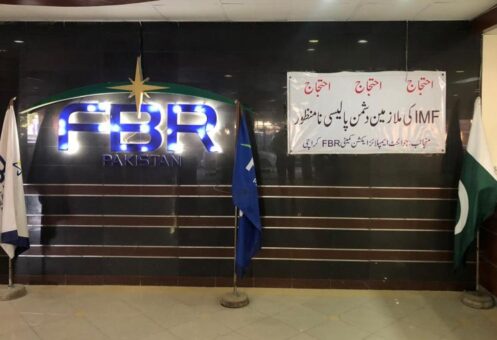
FBR officials display banners against proposed layoff plan
KARACHI: The officials of Federal Board of Revenue (FBR) have protested against new reform program planned by the government, which may result in layoff in the revenue body.
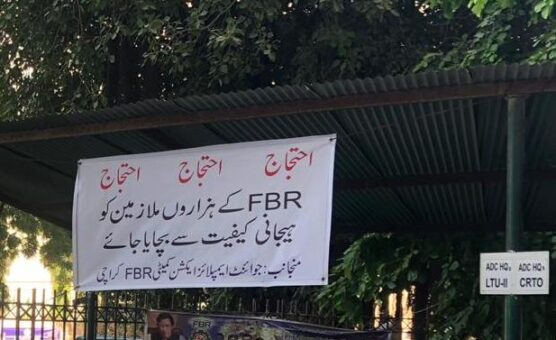

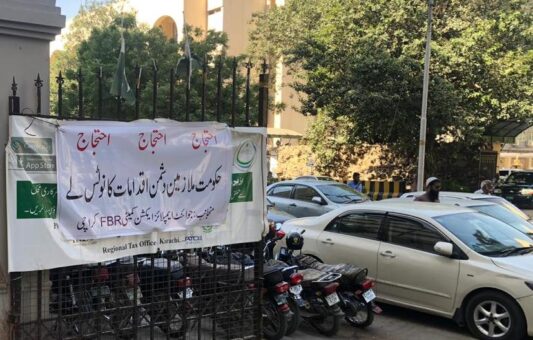
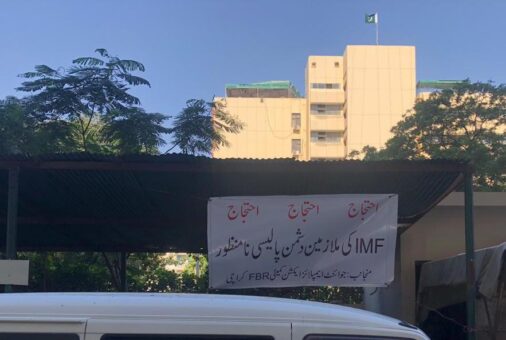
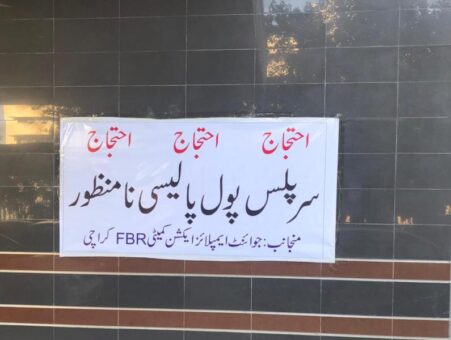
The officials at the Income Tax Building Karachi on Friday displayed protest banners around the building to express their resentment against the reform plan, which can cause surpluses of staff.
The officials through banners expressed their displeasure against IMF linked policy in Pakistan.
The officials are protesting against news reports which said around 10,500 IRS officials would become surplus in the new system.
The sources in the tax office said that for the past many years the government had banned new appointment in the FBR and the many of the existing staff were on verge of retirement.
-

FBR proposed to collect sales tax on services
ISLAMABAD: The federal government is planning to takeover right to collect sales tax on services from the provinces as it was felt the true potential of collection was not realized.
According to minutes of the meeting chaired by the prime minister to review proposed restructuring of Federal Board of Revenue (FBR) and domestic resource mobilization, held last month, it is discussed that revenue potential of General Sales Tax (Services) is not being fully realized owing to jurisdiction issues between FBR and provincial revenue authorities.
It is also discussed that cross provincial jurisdictional and conflict of interest issues also stifles collection of GST on services.
The sales tax on services needs to be collected centrally by FBR as per rates legislated by provincial governments.
Tax proceeds of GST on services can be transferred directly to provinces as per delineated jurisdiction and share.
In this regard it is decided that a joint committee comprising representatives of ministry of finance, FBR and provincial revenue authorities would be constituted to finalize proposal for central collection of GST on Services by the FBR.
It is further decided mechanism of transfer of tax proceeds of GST on services be worked out by the ministry of finance.
It is worth mentioning that prior the 18th Amendment to the Constitutions, the FBR was collecting sales tax on services. However, after the amendment the Sindh government was the first to establish a separate entity to collect sales tax on services arising within the jurisdiction of the province.
The other provinces also followed the same and set up their revenue collecting agencies.
Experts believed that the plan of the federal government would be reversal of such transfer of rights to the provinces.
-

FBR allows raids against unregistered manufacturers, suppliers
ISLAMABAD: Federal Board of Revenue (FBR) has given go ahead to directorate of intelligence and investigation for conducting raids against manufacturers and suppliers not registered under sales tax laws.
In this regard the Directorate of Intelligence and Investigation, Inland Revenue carried out raids against three unregistered units in Gujranwala, said a statement issued by Federal Board of Revenue (FBR) on Thursday.
The statement said that in continuation of a drive against un-registered persons involved in making taxable supplies who are liable to be registered under the Sales Tax Act, 1990, the Directorate of Intelligence and Investigation-Inland Revenue, Lahore has carried out action under Section 38 and 40 of the Sales Tax Act, 1990 after obtaining search warrants from the Area magistrate against the manufacturing/business premises of three un-registered units in Gujranwala on November 05, 2019.
The three unregistered units were involved in manufacture and supply of taxable goods i.e. sanitary ware, detergents and household gas appliances.
During the search carried out available record was resumed which is under scrutiny and further investigation in this regard is underway.
“The Directorate General Intelligence and Investigation-Inland Revenue shall continue such operations in order to unearth unregistered units/businesses which are making taxable supplies without payment of due amount of sales tax and causing huge loss to the national exchequer,” the FBR said.
-

Income tax return filing increases to record 2.667 million
ISLAMABAD: The income tax return filing has increased to record level of 2.667 million, according to Active Taxpayers List (ATL) for tax year 2018 released on Monday.
(more…)